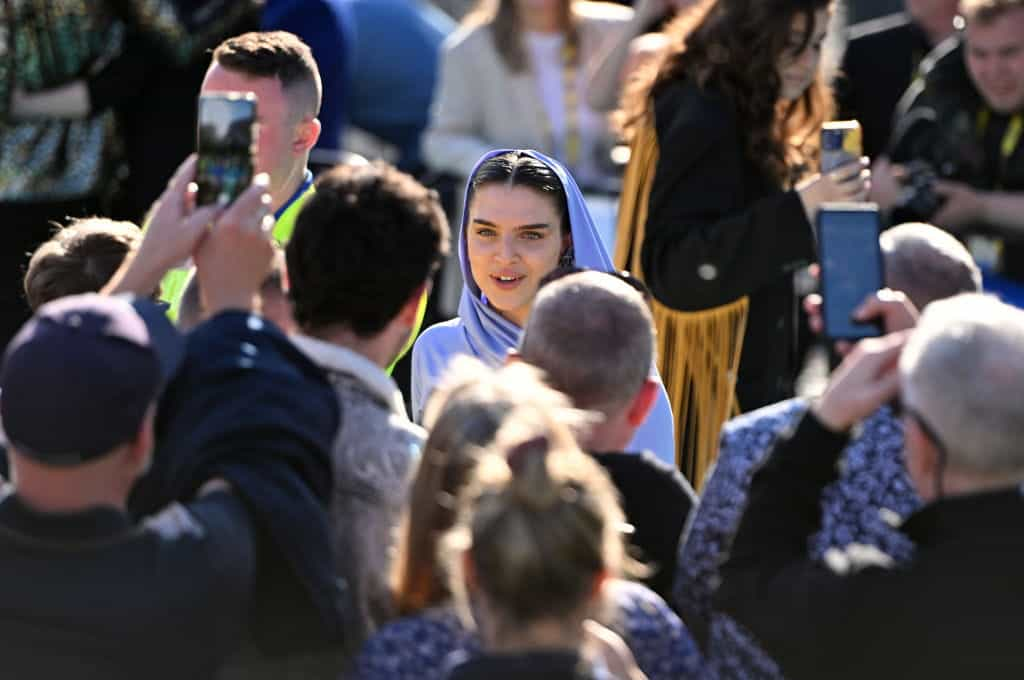2023 Eurovision Song Contest’s Figures Are Amazing
This weekend one of the world’s longest-running recurring television broadcasts will be beamed live across five continents. Public broadcasters from 37 countries are set to show viewers the unfolding drama from the 67th edition of the Eurovision Song Contest. It will take place in Liverpool.

Mae Muller, the UK’s Eurovision Song Contest representative, pictured at the 2023 Eurovision opening ceremony ?GettyImages
The Eurovision venue, Liverpool Arena, is expected to welcome 11,000 spectators. However, a predicted global audience of 160 million demands a colossal production. The host broadcaster, the BBC, has been eager to point out the enormity of hosting the performance on behalf of the 2022 Eurovision winners, Ukraine.
What Goes Into Filming the Eurovision Show?
Encapsulated in two kilometers of secure fencing, 140 tons of steel ground support structure will maintain 600 rigging points, a kilometer of truss work, and eight miles of cabling for lighting, sound and video. 950 square meters of staging for the main stage and another 500 square meters of staging for the green room have necessitated 2,000 specialist lighting fixtures and 200 custom staging decks.
The BBC says the lighting at the contest will be “truly breathtaking”, with 165,000 channels of lighting control across three operators, 23,700 individual light sources, and 2,500 automated state-of-the-art color-changing robotic lights. Its lighting team will use nine consoles to run 28,000 lighting cues, and there are 150 microphones and over 1,200 individual streams of audio.
Another crucial component of the Eurovision Song Contest is power. One megawatt of uninterruptible power supply needs to be channeled down 60 miles of cabling within the Liverpool Arena to feed 150 distribution boards.
Dress for Your Best in Eurovision
With cameras and sound equipment in place, 29 commentators will broadcast live from the arena. Behind the scenes, hair and makeup teams will be hard at work ensuring that every performer and presenter looks their best. One hundred wigs and hairpieces will be used in addition to 1,000 liters of hairspray, over 3,000 makeup brushes, and 5,000 hairpins.
Costume departments will also be busy. 150 meters of costume rails have been constructed – the equivalent of three Olympic-sized swimming pools in length – to store the 482 costumes that will be worn by performers during the Eurovision shows.
The UK’s Love for Eurovision
The 2023 Eurovision production will be the UK’s biggest. And the country has plenty of experience. With previous winners pleading poverty, the UK has staged the Eurovision Song Contest on behalf of the Netherlands (1960), France (1963), Monaco (1972), and Luxembourg (1974). That is a lot of love from a country that hosted but gave no points to ABBA in Eurovision 1974. The Swedish group’s performance of ‘Waterloo’ is considered Eurovision’s most iconic moment!
ABBA has become synonymous with Eurovision, but other world-famous artists have enjoyed time under the Eurovision spotlight. They include Cliff Richard, Julio Iglesias and Céline Dion. Despite Canadian citizenship, Dion won the competition for Switzerland in 1988 with the song ‘Ne Partez Pas Sans Moi’.
Finland With Shoes Are the Movers
Of the 37 nations taking part in the 2023 Eurovision Song Contest, 31 will compete in two semi-finals. Ten successful acts from each semi-final will join the ‘Big 5’ (France, Germany, Italy, Spain plus the United Kingdom) and defending champions Ukraine in Saturday’s Grand Final.
The best online betting sites report heavy support for Finland. 9/2 a month ago, the nation is now 15/8 to regain the prize it first won in 2006 with Lordi’s ‘Hard Rock Hallelujah’.
Finland, and odds-on Eurovision favorites, Sweden, will contest the first Eurovision semi-final. Norway will also be in action on Tuesday. At 16/1, the nation is fifth in the betting. The odds suggest it is unlikely the Scandinavian?country will add to its unwelcome record of finishing last nine times!
Another piece of form that may count for nothing is the success of barefoot performers. Eurovision winners Sandie Shaw (1967), Sertab Erener (2003), Dima Bilan (2008), Loreen (2012) and Emmelie De Forest (2013) all took to the stage without shoes. In 2023, it appears only one artist, Andrew Lambrou from Cyprus, might perform without footwear. He is 250/1 to win the competition.
???? And the rehearsals began!
Andrew Lambrou from Cyprus is back on stage – the only change that we can see is that he’s now barefoot.
His vocal range is extraordinary – those high notes are really quite something#eurovision #UnitedByMusic #cyprus #andrewlambrou pic.twitter.com/sBXUqvruqk
— Eurovision Insider (@escinsiders) May 5, 2023
How to Watch and What Will We See?
The Eurovision Song Contest 2023 Grand Final will be broadcast live on Saturday at 8 pm on BBC One, BBC iPlayer, BBC Radio 2, and BBC Sounds. Sign language translation will be available during the live show via BBC iPlayer.
Graham Norton, Alesha Dixon, Hannah Waddingham and Ukrainian singer-songwriter Julia Sanina will present the televised show. On BBC Radio 2, Eurovision superfans Scott and Rylan will bring their insightful and colorful commentary to the Grand Final.
During the Eurovision Flag Parade of all 26 Grand Finalists, viewers will be treated to a unique performance by some iconic past Ukrainian Eurovision contestants. And, during the voting period, Sam Ryder will return to the Eurovision stage following his valiant second-placed effort 12 months ago.
 Online Casinos UK
Online Casinos UK



